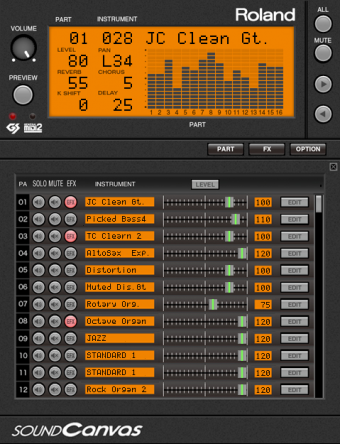Roland Sound Canvas VA: Difference between revisions
(link 8820 page) |
(remove empty notes section from infobox) |
||
| Line 11: | Line 11: | ||
| drumpresets = 63 + 2 user presets<ref name=rolandedsc8850-manual>[https://cdn.roland.com/assets/media/pdf/SC-8850_OM.pdf# Roland-ED SC-8850 Owner's Manual, page 247]</ref> | | drumpresets = 63 + 2 user presets<ref name=rolandedsc8850-manual>[https://cdn.roland.com/assets/media/pdf/SC-8850_OM.pdf# Roland-ED SC-8850 Owner's Manual, page 247]</ref> | ||
| effects = Reverb, Delay, Chorus, Two-Band global EQ, Global insertion FX based on BOSS effect units. | | effects = Reverb, Delay, Chorus, Two-Band global EQ, Global insertion FX based on BOSS effect units. | ||
}} | }} | ||
'''Roland Sound Canvas VA''' (popularly abbreviated as '''SCVA''') is a [[Roland Sound Canvas|Sound Canvas]] software synthesizer released in 2015. Notable for its solid attempt to bring the de facto standard desktop sound module into the modern era and being a software-based emulation of the [[Roland-ED SC-8820]]. Sound Canvas VA is available as both a VSTi and AU software synthesizer for modern computers. | '''Roland Sound Canvas VA''' (popularly abbreviated as '''SCVA''') is a [[Roland Sound Canvas|Sound Canvas]] software synthesizer released in 2015. Notable for its solid attempt to bring the de facto standard desktop sound module into the modern era and being a software-based emulation of the [[Roland-ED SC-8820]]. Sound Canvas VA is available as both a VSTi and AU software synthesizer for modern computers. | ||
Revision as of 00:51, 1 October 2024
 |
|
| Type | GM/GM2/GS software synthesizer |
|---|---|
| Manufacturer | Roland |
| Release date | 2015 |
| Standards | General MIDI General MIDI 2 Roland GS |
| Parts | 16[1] |
| Max polyphony | 64[1] |
| Normal presets | 1608 + 256 user presets[2] |
| Drum presets | 63 + 2 user presets[3] |
| Effects | Reverb, Delay, Chorus, Two-Band global EQ, Global insertion FX based on BOSS effect units. |
Roland Sound Canvas VA (popularly abbreviated as SCVA) is a Sound Canvas software synthesizer released in 2015. Notable for its solid attempt to bring the de facto standard desktop sound module into the modern era and being a software-based emulation of the Roland-ED SC-8820. Sound Canvas VA is available as both a VSTi and AU software synthesizer for modern computers.
Sound Canvas VA was first released standalone, then included with the Roland Cloud software-as-a-service subscription. This was discontinued on the 1st of September 2024, where it was no longer available for purchase.
Oddities
Discrepancies between Roland Sound Canvas VA and Roland-ED SC-8820
Sound Canvas VA is a software-based emulation of the SC-8820 Sound Canvas unit, utilizing the EPROM files from the original hardware. This means that Sound Canvas VA is designed to be a theoretically identical software replica of the Roland-ED SC-8820, offering the same sound and functionality in a virtual format. However, certain tones and filters may sound different or lack the accuracy of the original hardware unit. Additionally, there are discrepancies in specification information between Sound Canvas VA and the SC-8820 as noted in their respective manuals.
A list of few discrepancies and oddities
- The user drum[4] presets are not referenced in the SC-8820 or Sound Canvas VA manuals. Although the user drum presets work perfectly fine in the SC-8820 and SCVA, but you will need to use GSAE (GS Advanced Editor) to program them.
- Sound Canvas VA only has 16 parts though Roland-ED SC-8820 has up to 32 parts.
- Sound Canvas VA does not properly handle Assign Mode[5]; it is always set to full multi.
- Shifts the TVF Attack value randomly on a per-note basis.[6]
References
- ↑ 1.0 1.1 Roland Sound Canvas VA Owner's Manual, page 111.
- ↑ Roland-ED SC-8820 Owner's Manual, page 186
- ↑ Roland-ED SC-8850 Owner's Manual, page 247
- ↑ Roland-ED SC-8850 Owner's Manual, page 241.
- ↑ Roland Sound Canvas VA Owner's Manual, page 105.
- ↑ Tested by the following users:
- MJG0117, Purps and Valley Bell has tested and found that Roland Sound Canvas VA sometimes shifts the TVF Attack value randomly on a per-note basis.